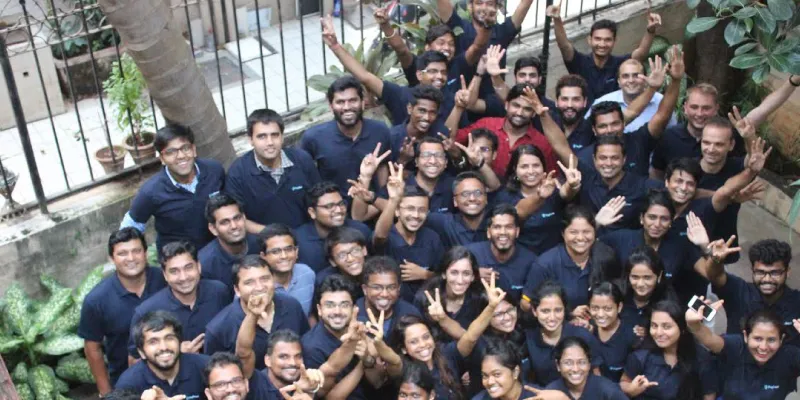Why is this ex-PayPal director bullish on giving Indians instant credit?
After spending a considerable amount of time in Silicon Valley, both Prashanth Ranganathan and Sayali Karanjkar saw a massive opportunity to start up in India. With a credit line concept, their startup would have given loans worth Rs 250 crore by the end of this fiscal year.
Having served as PayPal’s senior director managing products for the Asia-Pacific region for two years, it wasn’t much of a surprise when Prashanth Ranganathan decided to start up in the fintech domain. Convinced about the opportunity India presented, the Stanford alumnus returned home after 15 years in Silicon Valley.
Sayali Karanjkar had spent more than 14 years in the US and Singapore, working in operational and strategic consultative roles in large corporations including AT&T and AT Kearney.

The two met in early 2015 when Sayali was working as a management consultant and Prashanth was laying the groundwork for his fintech venture. With her interest in the consumer aspect of things and how credit is enabling financial independence, Sayali decided to join hands with Prashanth to come up with Mumbai-based PaySense. The company started operations and lending around May 2016.
Bringing aspirations alive
According to the founders, PaySense is a consumer lending platform that gives users credit in a customised manner. PaySense EMI, their personalised line of credit, is similar to a personal loan, and can be used to make instant purchases, whether online or offline, through affordable EMI plans. The upper limit of credit disbursed is Rs 2 lakh, which will soon be increased to Rs 5 lakh.
Moreover, the app allows users to either use the full credit amount available at one time or use it flexibly like a string of multiple EMIs for various smaller purchases as needed.
Explaining the need for their solution, Sayali says,
“People often require small loans for their lifestyle needs, ensuring that their money flow isn’t affected. Hence, our platform gives them the financial freedom to space out the payments through small instalments.”
Think of it in terms of a salaried individual who wants to buy an appliance like an air conditioner. Neither does he want to wait for too long and make his family suffer nor does he want his current cash flow to be affected. Hence, through these credit lines or short-term loans, he can space the payments out over a period of time.
Statistics indicate that users take loans on the platform for reasons as varied as courses and certifications, home renovation, and travel.
Once a customer does his e-KYC and fills in his basic information like name, address, Aadhaar, and PAN number, including setting their NACH auto-debit mandate, the credit line gets approved within five minutes.
NACH is a clearing house facilitating high-volume inter-bank transactions. The significant benefits to bank customers for setting up their auto-debit mandate includes automatic debits from their account for loan instalments, insurance premiums, and more.
PaySense is now working towards deploying the credit within five minutes.
The individual limit of the credit line for a particular user is decided based on his/her risk profile. However, if the customer’s repayment history on their platform has been good, PaySense doesn’t shy away from increasing the credit limit.
Sayali claims that 45 percent of the customers on the platform are subsequent loan takers or repeat customers.
Stacking up
The average interest rate on the platform is in the range of 1.4 percent–2.5 percent, according to the founders.
The platform has also recently opened up to individuals apart from salaried employees. At present, PaySense is partnering with IIFL (India Infoline Finance Limited) to lend capital to consumers and applicants.
Their customers broadly fall in the age bracket of 22–40, with 28–29 being the average age.
The credit platform also sees a majority of their customers coming from tier-1 cities like Mumbai, Delhi- NCR, Pune, and Bengaluru. Sayali says that they are also seeing a lot of demand from Gujarat.
With an average loan size of Rs 45,000–Rs 50,000, the firm has raked up a loan book of Rs 42 crore within a year of operations. The founders also claim that they receive more than 3,00,000 queries for their credit line on a monthly basis.
While paying EMIs, the company’s website highlights that if the customer’s bank has approved the NACH, PaySense will deduct the EMI amount from the savings account on the third of every month.
In case of the NACH mandate not being approved by the bank, one can go to the website and pay the due amount through net banking.
Speaking on controlling non-performing assets (NPAs), Sayali says that they try to educate the customer about the repercussions or try to make the EMIs flexible according to the consumer’s convenience.

In case of late payments, the firm does charge an additional two percent on the due amount every month. This might also help them adjust other NPAs in the books.
PaySense considers a loan as having been defaulted on if it is unpaid for 90 days or more.
Looking at the future, Sayali believes that PaySense will be able to grow its loan book to Rs 250 crore by the end of this year.
In total, the company has raised $7.6 million over two rounds of funding (seed and Series A) from Jungle Ventures, Naspers Group, and Nexus Venture Partners.
According to the company, the money is being used to enrich the product while building overall core capabilities. This also involves adding more members to the product team.
The market
At present, the short-term loan market is seeing a lot of new players cropping up. In the credit line segment, there is MoneyTap, which recently received a massive $12.3 million in funding from Sequoia India along with existing investors NEA and Prime Venture Partners.
MoneyTap states that the average credit line issued by the app is close to Rs 80,000, with the upper limit shooting close to Rs 5 lakh. By the end of this fiscal, MoneyTap aims to issue credit lines worth Rs 300 crore.
Targeting a similar audience is ZestMoney, a technology platform that facilitates the EMI payment option for products purchased online or offline through their partner merchants. With more than 50 merchants, the platform claims to have a user base of 2,00,000 consumers.
Recently, the firm has also tied up with e-commerce majors Amazon and Flipkart. In February, ZestMoney raised $6.5 million in a Series A round of funding led by Naspers, along with Ribbit Capital and Omidyar Network.
There is also Kissht, which provides electronic gadgets and many other products across categories on easy monthly instalments. But this space has also seen certain lows, with reports claiming that a similar business, Finomena, shut shop last month.
However, there are many players targeting various segments, including Avail Finance which gives loans to the blue-collar segment and KrazyBee and SlicePay aiming at college students and giving EMI-based loans.
Website: www.gopaysense.com







